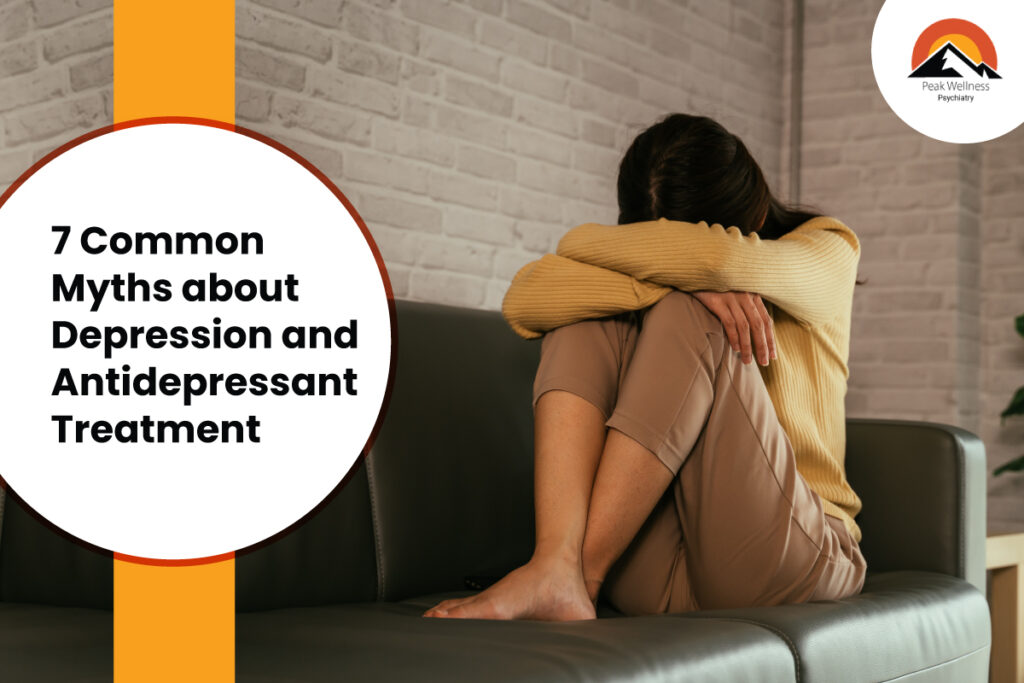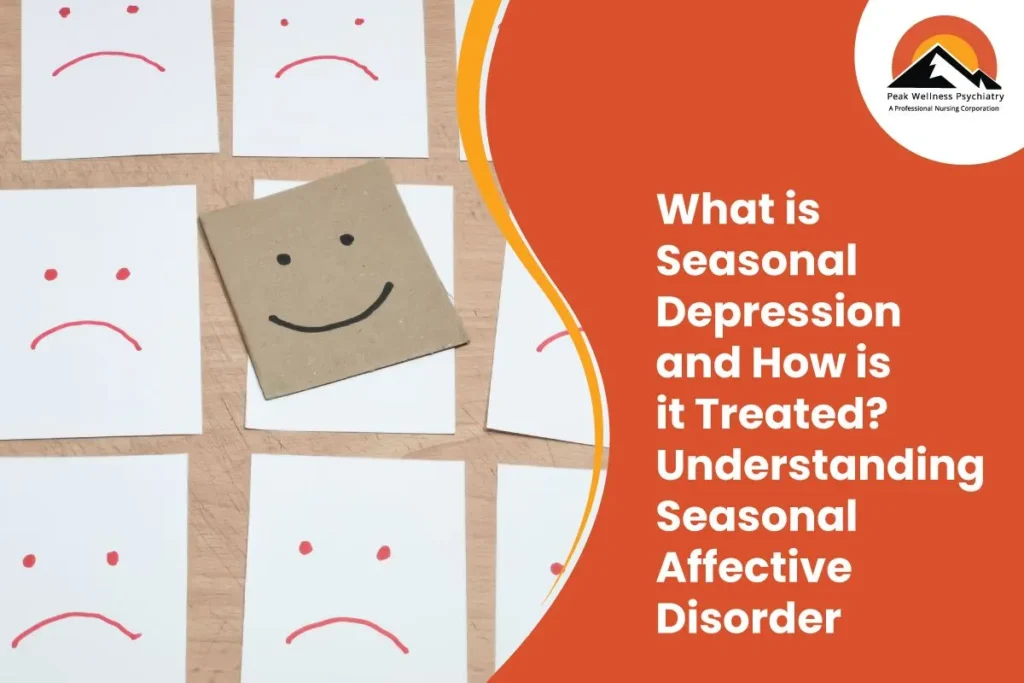If you think you may be experiencing depression or are unsure about the antidepressant treatments you’re taking, this article is perfect for you. This blog post will decipher the 7 myths about depression and remove the fallacies around the mental disorder. In addition, we will also provide facts about the effects of antidepressant treatments so that you can make a more informed decision and take action.
So, if you’re ready to dispel the myths about depression and the antidepressant medications to treat it, read on.
Are you experiencing depression, or do you know of someone who is experiencing depression?
Do you question if medications are part of the solution? The negative consequences of depression can be devastating for many people, leading to loss of quality of life, isolation, health issues, loss or reduced quality of relationships, missed work, and personal suffering. The complications of depression could negatively impact your life and affect your performance at work or school. The worst-case scenario is suicide.
If you are experiencing symptoms of depression, you are not alone. Depression is a silent killer that affects millions of individuals worldwide. The World Health Organization (WHO) reported that approximately 280 million adults have depression globally. Mental disorders like depression should never be taken lightly. A growing body of research shows that untreated depression can contribute to various physical health problems such as heart failure, obesity, diabetes, cancer, and weaken your immune system. Depression is not just an isolated condition, because it can negatively affect the entire body in profound ways over time.
Fortunately, depression is treatable and manageable. When you know more about depression and its treatments, you will be able to take more decisive action. We created this article to dispel common myths surrounding depression and its treatments.
Misconceptions About Depression
Myth Number 1: I Do Not Actually Have Depression
Often patients will come to us believing that the way they feel is normal and not an actual medical condition. Many who first schedule with us report having depression “for as long as I can remember .” When we explain to these patients that depression is a treatable medical or mental health condition, they are often relieved to know that their depression can go away with treatment. The truth is that there are many different types of depression and each person is unique in how the symptoms are expressed.
Depression may manifest externally as symptoms such as
- Low energy
- Depressed mood
- Hopelessness
- Low energy
- Increased isolation
- Lack of enjoyment
- Suicidal thoughts
- Self-harm
- Concentration difficulty
Depression is a mental health condition that is caused by many factors, such as neurobiology, medical conditions, drug or alcohol use, and environmental circumstances. Depression manifests differently in each person.
For some people, it may be obvious they are going through depression, such as when someone lies on the couch for much of the day or can not focus at work. Depression can often be very subtle and steal the quality of life of someone. Your depression and experience of depression are unique to you, so you do not have to settle for living with it. You deserve better!
Learn more about the different types of depression: Spot the Different Types of Depression
Myth Number 2: Depression is Common, and I Should Ignore It
Ignoring mental disorders like depression is one of the common mistakes that we observe in our patients. We often hear them say that they have been suffering from the symptoms of depression for as long as they can remember. Many patients will come to us after the depression gets so severe that their ability to meet basic demands becomes a significant obstacle leading to impaired relationships, academics, career, or lack of life satisfaction. Accepting depression without doing anything to manage it is not advisable.
There have been many effective treatments for depression over the past 20 years, which can significantly improve the quality of your life and lead to remission. In the medical world, remission means the disappearance of depression symptoms. We have helped thousands of patients get rid of these depressive symptoms through effective treatment of depression through
various methods such as medications, effective lifestyle changes, supplements (nutraceuticals), and nutrition.
For many people, getting the right help for depression can make a significant difference between living an unfulfilling life to living the life you have always dreamed of full of significance. It is not uncommon for us to see patients with depression who, when treated for depression, often will notice the disappearance of depressive symptoms that they did not know were a problem in the first place. We find that people can get so used to living with depression that they do not even know how severe their depression is until they are successfully treated with antidepressants, medications, and lifestyle changes.
There are effective ways to treat and manage depression. You do not have to settle for inadequate depression treatment. If you experience prolonged melancholy that affects your quality of life, seek professional help. Remember, if depression prevents you from living and embracing your life, it is not worth ignoring.
Myth Number 3: Depression is a Weakness. Snap Out of It!
Looking at depression as a sign of weakness is incorrect. As mentioned earlier in this article, depression is a real medical condition.
Have you ever worn your sunglasses too long after a sunset and noticed everything looked very dark around you? After you took off your sunglasses, you likely noticed things did not seem as dark as they appeared with the sunglasses on, and the world around you looked a bit brighter.
This is what happens with depression when it creates a more negative lens around you, which distorts your thinking, beliefs, and actions. Essentially everything is viewed negatively, including talking to a mental health provider about your depression. People with depression often have difficulty removing the glasses to find positivity and pleasure in their everyday life.
This is when treatment from a mental health professional is beneficial for depression. Instead of seeing depression as a weakness, consider depression as being a medical condition that can be changed over time by talking to the right psychiatrist or psychiatric NP to find a treatment plan that works for you.
Contrary to this myth, a person with depression can’t just snap out of this mental condition. However, with a proper treatment plan that includes quality mental health care, you can manage and treat depression. In many cases, patients will experience remission or absence of depressive symptoms with the right treatments.
During your initial visit, we see some patients who will tell us that they feel that depression is a weakness. Patients will also tell us that they delayed seeking treatment due to feeling that talking about their depression with a mental provider could potentially make things worse. Other patients may have had a prior experience in mental healthcare, in which they did not feel listened to or understood.
Often what people choose to believe about depression is highly influenced by what others around them believe about depression. Maybe you have had a bad experience discussing depression with family members, in which you felt they did not understand or respond how you expected.
When patients are talking about depression with close friends, they will often tell us that they were surprised to learn that one or more of their friends have had or are experiencing depression. In both cases, the friend or family member was unaware that they were experiencing depression due to their reluctance to talk about depression.
There are negative associations or labels that society often places on being depressed, which creates a stigma around depression for some people.
When people are depressed, we find that they can be reluctant to talk to a mental health provider about their depression due to the negative lens that they have created about the people and world around them. Consider this.
By choosing to speak to an experienced psychiatrist or psychiatric NP, you can take the first step to end the cycle of self-limiting beliefs about depression that are holding you back from getting the care that you deserve.
Myth Number 4: Depression is the Same as Grief
People often confuse depression with grief. However, you should know there is a significant distinction. You typically experience grief temporarily such as with the loss of a loved one, loss of a job, moving to a new place, or some other sudden life change. Symptoms of grief may present as feelings of guilt, sadness, anger, frustration, and crying.
Feelings of grief can occur as a reaction to something in your external environment, which is temporary. People with depression may experience persistent depressed mood or a loss of interest or enjoyment in nearly all activities with accompanying symptoms such as weight changes, fatigue, feelings of worthlessness, impaired concentration, and suicidal thoughts With major depression, the symptoms will persist most of the day for at least two weeks.
There is an important distinction between feelings of grief and depression; the difference is the transient nature of grief with periods of happiness in between episodes of sadness whereas depression is more pervasive and prolonged. With depression there is a significant functional impairment that can impair work, school, or social life. Regardless of whether it is depression or grief, if the symptoms are keeping the affected person from functioning fully in their day-to-day activities, treatment is accessible and recommended.
Myth Number 5: I Will Have to be on Antidepressants Forever
One of the most common misconceptions about depression is that patients will take antidepressants forever. The short answer is that the treatment duration in part depends on the severity of the depression, length of the depressive episode, previous episodes of depression, effectiveness of the medication, effectiveness of support patient systems, and patient preferences. Patients will often ask us, “How long do I need to take medications for?” Patients with unresolved trauma may also require longer durations of treatment.
According to the American Psychiatric Association guidelines, if it is your first episode of depression, you should stay on the antidepressant for four to five months after your depressive symptoms have resolved. It may take two to three weeks to see a difference in depression to improve on antidepressant medications initially. In other cases, the American Psychiatric Association recommends treatment for more than a year, such as with patients with an ongoing major depressive disorder with a history of three or more depressive episodes.
Seek professional help if you think that you are suffering from depression. Do not wait for it to affect your ability to spend quality time with your loved ones.
Myth Number 6: Taking Antidepressants Will Change My Personality
During the initial visit, patients will sometimes wonder if taking an antidepressant could change their personality. This is one of many myths about antidepressants that people sometimes have.
A personality change can occur in people with depression due to the negative effect that the symptoms of depression can have on their personality qualities, however this is not due to the medication. Without medication, patient with depression may report being less extroverted, more conscientious, less agreeable, and having less emotional stability. When patients are treated with antidepressants, we often find that more of their underlying personalities will emerge.
Perhaps you know a friend who has taken an antidepressant. I recall a patient recently who remarked that their friend was on an antidepressant and stopped “because they said it made them feel like a zombie and not very clear-headed”. Often, people sometimes stop medications for different reasons that was not due to a medication side effect such as forgetting to take the medication or perceived stigma of taking a medication.
For instance, some patients can experience fatigue on antidepressants, which often is mild and resolves after a few weeks. During the initial visit, it is very common that patients will be unclear whether a medication they previously stopped was causing a side effect, “as I had a lot going on in my life at the time”.
In reality, we often find that a patient was already experiencing fatigue and difficulty focusing before they started the antidepressant. Other times, the patient may have started at too high of a dose of Zoloft (sertraline), Lexapro (escitalopram), or Prozac (fluoxetine). When re-trialed at a lower dose, patients often reduce their symptoms and improve their quality of life.
Unfortunately, when you experience depression, this can lead to less fulfilling quality of life experiences that meet your values when experiencing low energy, lack of enjoyment, or being more isolated. People with depression may avoid areas of their life that they value such as friends, family, kindness, connection, growth, contribution, significance, certainty, and variety. Antidepressants treat the underlying symptoms of depression, which often improves a patient’s quality of life.
Myth Number 7: Medications are the Only Treatment for Depression
Patients will often ask us, “Are medications always the best option for treating my depression?”. The short answer to this question depends on the individual and the causative factors of their depression. The standard model of medicine often focuses on reducing symptoms and managing illness. In contrast, we use an integrative approach to treating depression to help patients make lifelong positive changes in areas of their life such as relationships, sleep, habits, nutrition, and exercise. We find that this integrative approach often leads to superior outcomes for patients.
In addition to antidepressants, other lifestyle modifications can enhance depression treatment. Consider exercise. We all know it is good for us; however, people often will stop exercising over time. We often find that when people with depression isolate or avoid physical activity, this leads to missed opportunities with relationships, life goals, leisure activities, health, and career. Recent research demonstrates that exercise increases a growth hormone known as brain-derived neurotrophic factor (BDNF), which can lead to generation of new neural connections and upregulation of dopamine and serotonin. Thus exercise appears to have an antidepressant effect.
We will sometimes add other supplements to antidepressant treatment to potentially enhance the effectiveness of patients’ antidepressants. For example, certain curcumin supplements have been shown to enhance antidepressants to more effectively treat depression and other co-occurring mental health conditions such as PTSD, OCD, and bipolar.
Depression Treatment That Works for You on Your Schedule
At Peak Wellness Psychiatry, we recognize the need for individualized psychiatric care with medication prescriptions for depression that considers the individual’s unique health needs.
The reality is that everyone experiences depression uniquely, which is why we offer comprehensive treatment approaches tailored to each patient’s needs and values.
Should you decide on an online psychiatrist or psychiatric nurse practitioner to help you, look no further! At Peak Wellness Psychiatry, we offer online psychiatry to California, Arizona, and Washington patients. We also accept a variety of insurances and offer convenient online medication prescriptions for depression.
If you are looking for answers for your depression then why wait? You can schedule right now with one of our experienced, compassionate online psychiatrists or psychiatric nurse practitioners for online psychiatry to get the care that you deserve!
Choose your preferred clinic location here.




